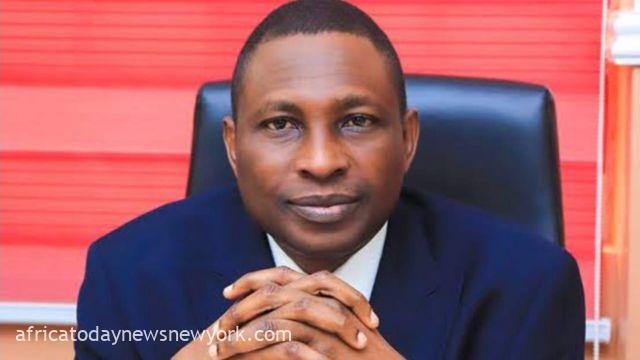The Chairman of the Economic and Financial Crimes Commission (EFCC), Ola Olukoyede, unveiled the creation of a centralized system designed to monitor and track seized landed properties involved in alleged money laundering investigations across the country.
Ola Olukoyede raised the issue of imbalance, revealing that the United States generated approximately $3 billion from the FBI Haliburton probe, whereas Nigeria did not profit financially from the EFCC’s launch of the identical investigation.
Ola Olukoyede shared these details on Monday at the EFCC’s national headquarters in Jabi, Abuja, during an interaction between the commission and civil society organizations.
Olukoyede said, ‘About 80 percent of our ongoing major investigations came from petitions from civil society groups. This means that we have a very active civil society sector. Let us be focused, we will see the light at the end of the tunnel.’
‘There are three areas of focus, and there is a need for us to redirected our focus. Our job shouldn’t only be about arrests, detentions, and prosecutions. I’ve told our operatives and staff, the focus shouldn’t be about using the instrumentality of anti-corruption to stifle economic development, rather our activities should help improve economic development.’
Read also: EFCC Outlaws Sting Operations At Night, Gives Reasons
‘If all my conviction of people does not contribute to economic development, how does it add value to the system? For example, the United States government generated about $3bn from the Haliburton case which was instituted here in Nigeria by the EFCC, but Nigeria did not benefit anything from the Haliburton investigation.’
‘I told my staff and operatives, whenever you are investigating, there is a need for us to use the instrumentality of the anti-corruption fight as an instrument to generate employment resources. Not totally closing down companies’ accounts while the investigation is ongoing. Some accounts get closed for about 15 years. Over N1tn was lost in 2018, because we PNDed over N1tn. When such companies are shut down, they cannot assess funds and they sack workers, and the companies go down.’
‘We are changing that completely, we won’t shut down entire businesses over ongoing investigations. However, when we discover companies that were actually set up to destroy our economy, we will shut such down. But for real companies undergoing investigation, we’ll let companies be allowed to operate while focusing majorly on the actual funds being investigated.’
‘Henceforth, the style of marking properties will be changed in a way that it will not be noticeable that the EFCC had marked them, as it currently is, painting the properties from top to bottom. Our markings henceforth will not be noticeable in order not to stigmatize such properties and stifle economic activities. We would rather use the instrumentality of anti-corruption to improve the economy.’
‘Also, there’ll be a policy review, we’ll come up with a comprehensive review to look at what we might have been doing wrong. Also, the disposition of our staff; must be a foremost and sophisticated white-collar anti-graft agency, and this must be evident in the ways we do our things. There’ll also be revised guidelines for arrests and detentions in accordance with the constitution.’
‘If the law says release a suspect within 48 hours, even without trial, we’ll release them as a law-abiding agency. However, the same law that says we should release them within 48 hours gives us the power to rearrest them; so, why violate the law concerning detentions when there’s a provision that allows you to rearrest suspects? I can arrest, obey the law, and release you but the same law says we can rearrest you.’
‘We must operate within the dictates of the rule of law. Because as I am here today, I can be on the other side tomorrow, not particularly as a suspect under investigation, but as an average Nigerian. I pledge to the whole country and God who put me here that I will serve the nation diligently.’

